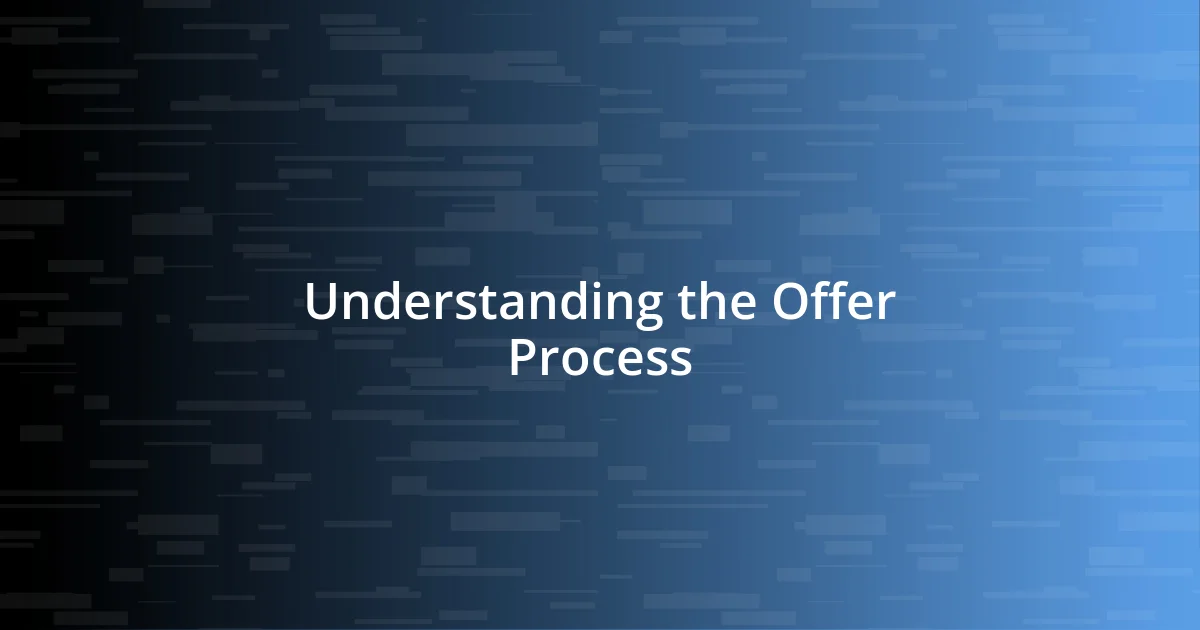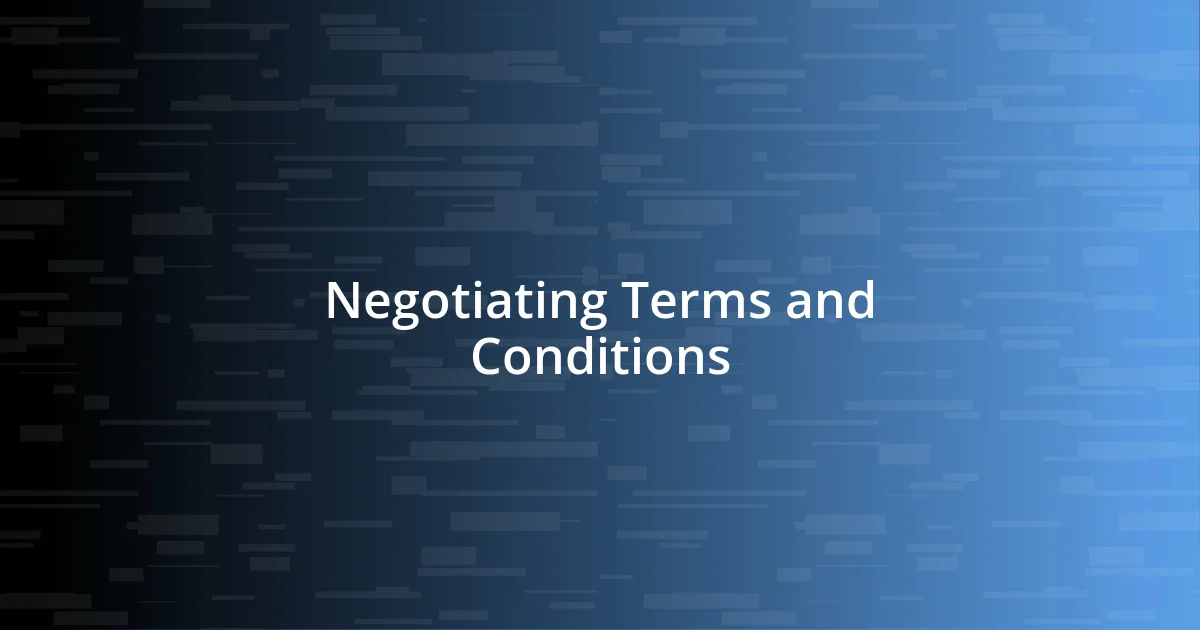Key takeaways not available due to an error.

Understanding the Offer Process
Understanding the offer process can feel like navigating a labyrinth, and it can be overwhelming at times. I still remember the first time I made an offer on a property; the anxious excitement was almost palpable. It struck me how crucial it was to be well-informed about each step, from crafting the actual offer to understanding the terms and contingencies involved.
When I made my last successful offer, I felt a mix of dread and hope. It was the moment when I realized how vital research was—it’s not just about the price but also about the timing and how the seller views offers. Have you ever considered how your emotions can influence your offer? I learned that staying grounded and creating not just a number, but a well-thought-out package, made all the difference.
Clarity and confidence are your best allies during this phase. Reflecting on my experiences, I found that articulating why I was interested in the property genuinely resonated with sellers. I often wondered, how can my perspective make my offer stand out? Sharing my vision helped build a connection, making it more than just a transaction. Each offer is a personal story, and the more you infuse your narrative into it, the stronger it becomes.

Researching the Market Value
When I started diving into the market to make my offer, I knew I had to put in the work. I spent hours scouring listings, speaking with local realtors, and even visiting open houses. It was an exhilarating yet daunting task—each property told a million stories, but understanding their true worth felt like trying to decode an ancient language.
A quick way to gauge market value includes:
- Analyzing recent sales of comparable properties in the area (or “comps”) to ensure you’re in the right ballpark.
- Investigating price trends over the last year—this can reveal whether a neighborhood is on the rise or if it’s plateauing.
- Considering additional factors, like location, amenities, and school districts, as they can heavily influence price.
- Reaching out to local real estate experts for their insights—sometimes, their intuition about a neighborhood holds immense value.
With these tools, I learned how to navigate those murky waters, which ultimately led to a successful offer in a competitive market.

Crafting a Strategic Offer
Crafting a strategic offer goes beyond just numbers; it’s about understanding the seller’s psychology too. I recall a time when I could sense a seller’s attachment to their home. Instead of presenting just a bid, I included a personal letter explaining what I loved about the property. This approach unexpectedly transformed my offer into a conversation rather than a transaction. Engaging emotionally can create a connection that distinguishes your offer from the others.
What truly sets apart a well-crafted offer is the balance of competitive pricing and flexible terms. When I submitted my last successful bid, I was prepared for a bidding war, but I also offered to close quickly—a key pain point for the seller, who needed to relocate. By tailoring my terms to their needs, I not only made my offer appealing but showed that I understood their situation. How often do we consider the other party’s perspective in negotiations? I learned that flexibility can often be just as valuable as the offer price itself.
Lastly, thorough preparation is essential. I once faced a situation where I rushed my offer, neglecting the inspection clause. It taught me the hard way that crafting a strategic offer means thinking ahead. I always make sure to include provisions that protect both my interests and those of the seller. In essence, a strategic offer is like a well-rehearsed performance; both sides need to feel like they’re benefitting for it to resonate.
| Key Element | Personal Insight |
|---|---|
| Emotional Connection | Including a personal letter about the property’s appeal helped secure my offer |
| Flexible Terms | Offering a quick close can make your offer stand out |
| Thorough Preparation | Always include protective provisions in your offer |

Presenting Your Offer Effectively
Presenting your offer effectively is like showcasing a well-polished gemstone; every detail counts. I remember the moment I submitted my offer for a charming cottage. Instead of simply sending the paperwork, I made sure to deliver it in person, allowing me to explain my position and enthusiasm directly to the seller’s agent. This personal touch made me feel more invested and, I believe, added a layer of sincerity to my offer.
It’s fascinating how the format and presentation can influence perception. On one occasion, I noticed how a clear, organized offer stood out against a sea of chaotic ones. I took the time to create a neatly formatted PDF, highlighting my key points. Frankly, when you present your offer in an easy-to-read manner, it not only makes it simpler for the seller to digest but also conveys a sense of professionalism and respect for their time.
Have you ever thought about the power of anticipation? When I was ready to present an offer, I made sure to build excitement beforehand by communicating with the seller’s agent. By sharing my genuine interest in their property and asking about their priorities, I felt like I was laying the groundwork for a compelling case. Because in the end, effective presentation isn’t just about what you say; it’s also about how you make the other party feel throughout the process.

Negotiating Terms and Conditions
Negotiating terms and conditions is where I truly believe the magic happens. I recall a situation where I negotiated the closing timeline to align with another buyer’s needs. By doing this, not only did I show understanding, but I also created a cooperative atmosphere. Have you ever considered how a small adjustment in terms can lead to a significant impact on your relationship with the seller?
Another key aspect I find essential is prioritizing contingencies. In a recent experience, I included a contingency clause that allowed for the inspection of the property, which gave me peace of mind. It’s easy to get carried away in the excitement of an offer, but I’ve learned that laying out clear terms protects both my interests and those of the seller. It’s about finding that sweet spot where both parties feel secure.
Flexibility can also become a leverage point in negotiations. I once negotiated a slightly higher offer price in exchange for waiving the appraisal, which was a risk I was willing to take for a property I loved. This role reversal not only made my offer standout but provided the seller with a sense of ease. At what point do we realize that being adaptive can sometimes lead to a win-win situation? I believe it’s often when we’re willing to think outside the box and reassure the other party that we are all aiming for a shared outcome.

Closing the Deal Successfully
Closing a deal successfully is often the culmination of careful planning and genuine engagement. I remember the day I secured a contract for the condo I had my eye on. After weeks of back-and-forth discussions, I realized that this wasn’t just about numbers; it was about forming a connection with the seller. When I took the time to express my appreciation for their home’s unique features, it seemed to resonate with them. “Have you ever thought about how pivotal emotional connections can be in negotiations?” I know firsthand how a heartfelt compliment can turn the dynamics in your favor.
As I navigated the final stages, I kept a close eye on the tone of communication. During one deal, I sensed hesitation from the seller after presenting my final offer. Instead of pushing hard, I opted for a collaborative approach by inviting them to share their concerns. I felt that this open dialogue was crucial; by acknowledging their feelings, I reinforced trust and made it easier for them to come back to the table. I truly believe that empathy can be the bridge that closes any gap.
On the day I formally accepted the terms, I felt a mix of relief and excitement. I knew that sealing the deal wasn’t just about signing documents; it was about recognizing the journey we had all taken. Reflecting back, I often consider how the process taught me invaluable lessons about patience and perseverance. Isn’t it fascinating how each closing experience enriches our understanding of negotiation? For me, every successful deal feels less like a transaction and more like a shared victory.

Learning from the Experience
Learning from each experience has become a cornerstone of my growth in negotiations. I recalled a time when I misjudged a seller’s urgency, leading to a missed opportunity. That moment taught me that understanding the emotional landscape of negotiations is just as important as crunching the numbers. Have you ever struggled with reading the other party’s cues? I surely have, and it emphasizes how crucial it is to listen actively.
I also remember a particularly challenging closing where my confidence wavered. I felt unprepared during the final discussions and worried that I may not get the terms I wanted. But that experience became a powerful lesson in preparation and adaptability. Now, I ensure I’m armed with comprehensive knowledge about the property and market trends. Isn’t it funny how our most stressful moments often lead to the greatest revelations?
Reflecting on my negotiation journey, I realize that patience and humility have been vital. I once collaborated with a seasoned negotiator who reminded me that often, less is more. I learned that stepping back can provide space for the other party to express their desires. How has patience played a role in your own negotiations? I believe it creates room for genuine dialogue, which can ultimately transform the entire process.














